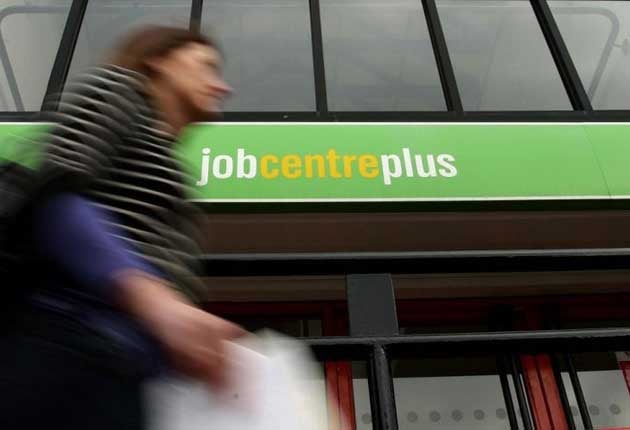Jobless rise 'disappointing', says George Osborne

Your support helps us to tell the story
From reproductive rights to climate change to Big Tech, The Independent is on the ground when the story is developing. Whether it's investigating the financials of Elon Musk's pro-Trump PAC or producing our latest documentary, 'The A Word', which shines a light on the American women fighting for reproductive rights, we know how important it is to parse out the facts from the messaging.
At such a critical moment in US history, we need reporters on the ground. Your donation allows us to keep sending journalists to speak to both sides of the story.
The Independent is trusted by Americans across the entire political spectrum. And unlike many other quality news outlets, we choose not to lock Americans out of our reporting and analysis with paywalls. We believe quality journalism should be available to everyone, paid for by those who can afford it.
Your support makes all the difference.Chancellor George Osborne today admitted official figures revealing an unexpected rise in unemployment were "disappointing" but not "entirely unexpected".
The country's jobless rate stood at 2.49 million, or 7.9%, between April and June, the Office for National Statistics said, after the total number of unemployed increased by 38,000.
The increase was the largest since May 2009 and the first since January, while economists had expected a fall of around 10,000.
Within the figures, the number of unemployed women hit levels not seen in more than 23 years, while youth unemployment covering the ages between 16 and 24 moved closer to the politically sensitive one million marker at 949,000 or 20.2%, up 0.2% from the three months to March.
Elsewhere, the number of people claiming Jobseeker's Allowance (JSA) showed the biggest monthly rise in more than two years, increasing by 37,100 to 1.56 million people.
The figures prompted calls for the Chancellor to reconsider his tough programme of public sector spending cuts - which includes hundreds of thousands of job losses across the UK.
Mr Osborne is banking on a healthy private sector to pick up the slack in the economy but recent figures showing sluggish 0.2% growth in the second quarter have raised fears over the strength of the recovery.
Dave Prentis, general secretary of the public service trade union Unison, said the Government's "savage" cuts have ended opportunities in the public sector and the private sector is struggling to withstand the economic downturn.
He said: "The Government's economic strategy is in tatters. They need to stop the cuts and restore hope by planning for growth."
Stephen Timms, Labour's shadow employment minister said the Government was creating a vicious circle by cutting "too far and too fast".
But the Chancellor said: "With what is going on in the world economy and with world markets, they (the figures) are not entirely unexpected.
"There is some good news that employment, those in work, is still going up. We are creating jobs in this economy as well as jobs being lost."
Average earnings increased by 2.6% in the year to June, up by 0.3 percentage points over the previous month, with weekly wages now averaging £462.
While this was the largest rise since April last year, the increase in average wages was driven by a bumper period for private sector bonuses and still falls far behind the high rate of inflation, which stood at 4.2% in June and increased to 4.4% in July.
The number of people unemployed for up to six months increased by 66,000 over the quarter to reach 1.23 million - the largest quarterly increase in two years.
The number of unemployed men increased by 18,000 to 1.45 million, while jobless women increased by 21,000 to 1.05 million - the highest figure since May 1988.
The number of employees working part-time because they could not find a full-time job increased by 83,000 on the quarter to reach 1.26 million - the highest figure since records began in 1992.
The number of men claiming JSA increased by 21,500 to reach 1.05 million and the number of women claimants increased by 15,600 to reach 512,700, the highest figure since April 1996.
The employment rate in the UK increased by 25,000 in the three months to June to 29.27 million or a rate of 70.7%. The number of employed people is still 307,000 lower than the pre-recession peak of 29.57 million recorded in the three months to May 2008.
Chris Williamson, chief economist at financial services information company Markit, said: "Survey data indicate that unemployment is likely to continue to rise in coming months as private sector employers fail to make up for public sector job cuts."
But the Department for Work and Pensions said the Government had introduced measures to stimulate job growth across the UK.
The introduction of 11 new "Enterprise Zones", designed to boost local growth and create more than 30,000 new jobs by 2015 and a £1.4 billion Regional Growth Fund (RGF) for projects to support growth are among the Government's initiatives.
Employment Minister Chris Grayling said the figures were disappointing but added that "the road to recovery would be choppy".
He said: "Clearly this has been a difficult few months, with a range of one-off factors and a slowdown in the world economy having an impact on the UK.
"This is why we are focused on taking steps to increase growth, support the economy and encourage businesses to invest and create jobs."
PA
Region / Total / Change on Unemployment
North East 126,000 minus 4,000 10.0%
North West 300,000 plus 35,000 8.8%
Yorkshire/Humber 223,000 minus 21,000 8.5%
East Midlands 187,000 plus 10,000 8.0%
West Midlands 224,000 minus 30,000 8.5%
East 197,000 plus 10,000 6.5%
London 406,000 plus 22,000 9.5%
South East 260,000 plus 5,000 5.8%
South West 175,000 minus 1,000 6.6%
Wales 122,000 plus 10,000 8.4%
Scotland 209,000 plus 1,000 7.7%
N Ireland 63,000 plus 2,000 7.3%
Join our commenting forum
Join thought-provoking conversations, follow other Independent readers and see their replies
Comments